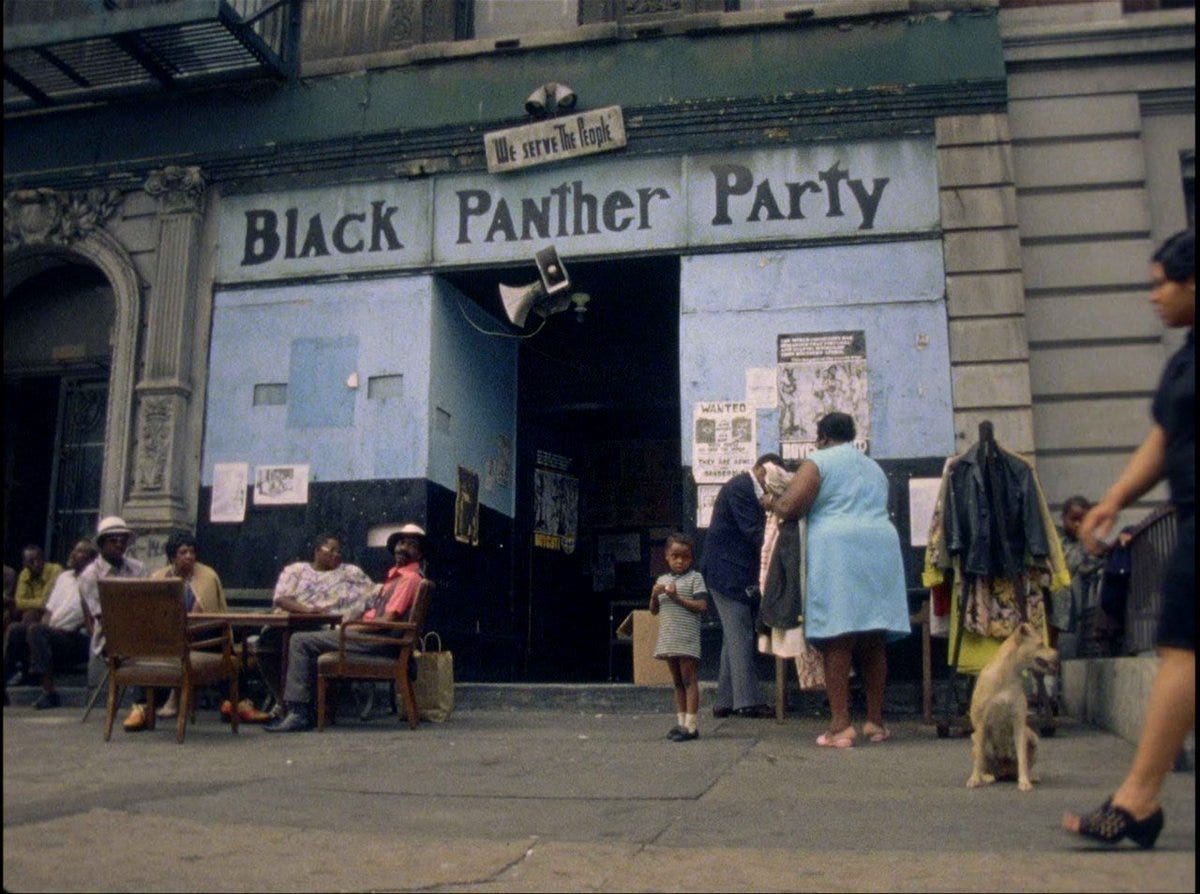Black Panther Community Center, Harlem; 1968
It was likely always a doomed proposition – trying to turn a country born of two ongoing genocides (Native Americans; enslaved Africans and their descendants) into an actual civilization. But I think there was a narrow window of time when it was slightly possible, before a lot of people fully grasped the magnitude of what was lost in the government take-down of the Black Panthers and the assassinations of Martin Luther King, Jr. and Malcolm X (and Medgar Evans and Fred Hampton and…,) before drugs were flooded into the Black community (RIP Gary Webb,) before Joe Biden sponsored the 1994 Crime Bill that massively expanded the prison industrial complex which fed so heavily on the over-policed Black community….
I have to consciously put in the work to parse nostalgia from critical analysis that makes a point beyond emotionalism. In the book I hope to drop next year, I have a piece on the music of the 1970s and what’s all embedded in it, what it bottled, what it pushed forward. I love music across genres and eras but so much American music from the 1970s is on some next-level shit, floating through the looking glass from a dimension of spiritual well-being that’s the antithesis of this country. And Black American/African American music is the soundtrack to the fleeting possibility of America transcending itself to become what its PR always sold it as. That moment long ago passed and what we’re struggling to live through now is the distillation of what the U.S. of A. has always been. Whatever future might still exist will not be forged through reformation or reclamation of America, but through the building of something else entirely from its bones on top of its corpse.
The clips below feed me and spark a twinge of the mood indigo. It’s heartbreaking that the beauty & hope of the music and performances, which are really maps to freedom and manifestations of what free Blackness might look like, were co-opted, subverted and paved over by systems and institutions which would profit from the music but keep a bullseye on the backs of the people whose culture made it. It’s inspiring that the potency of the music and performances remain undiluted after all these years and can still work their root magic. What many non-Blacks (and, increasingly, many Black people) who engage Black American/African American music miss is that this is political and cultural theory put to melody and meant to be put into practice. And it’s not just the genius of Gil Scott-Heron, Nina Simone, Marvin Gaye, Odetta, Curtis Mayfield, Abbey Lincoln, Stevie Wonder, and the rest of the canon of Black music artists whose art is avowedly political; it’s also what threads the music and even personas of many one-hit wonders and certified pop stars of the ‘70s. This is tricky ground because contemporary rabid but unread fan-bases project all manner of political intent and meaning on music figures whose only real goal is accumulation of the twin currencies of celebrity and ducats. We have to be careful not to overstate or inflate a radical – or even real – political meaning when talking about music artists even as we glean deeper messages than might be obvious at first listen.
We start with a couple of clips celebrating pre-gentrification Harlem, segue into a celebration of Black children followed by a peeling back of the glamor of a legendary girl-group for a close listen to the lyrics of two of their underrated tracks, and then ends with a live performance by a group that should be mentioned in the very same breath as the Beatles, the Rolling Stones, or any other iconic white band you can think of. Then we come full circle to a couple of quick clips that illustrate the points I made at the very top of this piece. Dig in. Peace…
A clip from the 1973 documentary, “Harlem Voices, Faces”
Second clip from the 1973 documentary, “Harlem Voices, Faces”
Five Stairsteps, “Ooh Child”
The Voices Of East Harlem, “For What It's Worth” & “Over My Head” on The Ed Sullivan Show November 30, 1969
The Voices Of East Harlem Run, Shaker Life on The Ed Sullivan Show May 31, 1970
The Jackson 5 Medley, “Stand,” “Whos Loving You,” “I Want You Back” on The Ed Sullivan Show
An underrated post-Diana Ross Supremes tune that walks the line between a love song and an ode to brotherhood…
Another great post-Ross Supremes tune that’s a straight ahead plea for brotherhood across borders. I miss the dramatic opening of the album version but this single edit they performed on TV shows when the single was first dropped still packs a punch.
This fantastic live performance is from 1981 but the track itself, “That’s the Way of the World,” is from 1975 — one of many Earth Wind & Fire classics.
A young Native American activist breaks it down for you…
This short piece kicks off with an interview with the great Paul Robeson and then moves into its argument. The automated voice-over is a tad grating but the info is worth your time.
Dr. Jared Ball (one of my favorite contemporary thinkers) explains how the world we currently live in only exists because Malcolm X was assassinated. Above is the excerpt where he does that; the full conversation is below (the convo with Dr. Ball begins at the 19:55 min mark.)





My Friday night: 👀🍿💃🏾